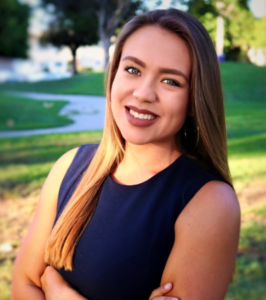Uplifting Latina Voices Through LPPI, Telemundo Partnership Kassandra Hernández MPP '20 makes relevant research about the impacts of COVID-19 accessible to a Spanish-speaking community
By Zoe Day
During the COVID-19 pandemic, Latinas went from being one of the fastest-growing groups in the labor force to one that was hit hardest by unemployment, with 2.4 million Latinas out of work in April 2020.
This finding from the Latino Policy and Politics Initiative (LPPI) at UCLA Luskin is part of a broad body of research on the pandemic’s impact on Latino populations — research that is now being shared with a wider audience through a partnership with Spanish-language news station Telemundo 52.
LPPI research analyst Kassandra Hernández BA ’17, MPP ’20 sees the collaboration as an opportunity to uplift Latina voices and make relevant research more accessible to Latino populations.
“The reports we produce are nothing if no one reads them,” she explained. “We’re studying the impact [of the pandemic] on Latinas, and we would like to reach the people who are being impacted.”
A Telemundo newscast featuring Hernández focused on Latina participation in the labor market, which had been projected to experience substantial growth until the pandemic forced many Latinas to choose child-care duties over paid work. LPPI Director of Research Rodrigo Dominguez-Villegas also appeared in the segment, underscoring that “Latinas are overrepresented in sectors hardest hit by the pandemic.”
As a native Spanish speaker, Hernández welcomed the chance to connect with the populations that her research focuses on, in their own language.
“Different media outlets are accessible in different languages, but English doesn’t reach Latinas in the same way,” she said.
Two other Telemundo reports featured LPPI-affiliated scholars who shared their expertise on COVID-19’s impact on Latino populations. In one segment, Melissa Chinchilla, a research scientist who studies the intersection of housing, health and community development, explained how unemployment caused by the pandemic led many to move in with friends and family, increasing the risk of COVID-19 transmission within households.
“Affordable housing and the capacity to accommodate multigenerational families are issues that will require long-term investment,” Chinchilla said.
In another report, Yohualli Balderas-Medina Anaya, a medical doctor on the faculty of the David Geffen School of Medicine at UCLA, discussed the long-term symptoms experienced by some COVID-19 patients even after the infection has passed. Anaya expressed concern that some side effects will continue to affect patients for years.
Telemundo reporter Enrique Chiabra, a UCLA alumnus, presented the three-part series aimed at making information about the COVID-19 pandemic accessible for Spanish-speaking populations. That is a key priority for Hernández, who has worked with LPPI faculty experts including Executive Director Sonja Diaz to interpret research and push it into the public sphere.
“Academic research is often not as accessible to the communities it focuses on,” she said. “I want to analyze inequities and share knowledge; I don’t want to stay in the ivory tower.”
Hernández is a double Bruin who earned her bachelor’s degree in philosophy and labor and workplace studies. After graduation, she worked with AmeriCorps on food insecurity before going back to school to develop her skills in quantitative analysis.
“As a Latina, I have lived what I find in numbers,” said Hernández, a first-generation college graduate and the daughter of Mexican immigrants. She spoke about her own mother’s challenges balancing responsibilities as a domestic worker and the demands of being a parent and caretaker.
“I realized not everyone has those same experiences, but I can use numbers as evidence to validate my own story.”
Hernández said she chose the master of public policy program at UCLA Luskin because of the supportive faculty and the opportunity to engage with real-world issues. The experience “opened up my eyes to what I could do and how to analyze policy,” she said.
Hernández’s research with LPPI has helped shed light on the gender norms and expectations that often push Latina women aside or confine them to the household. The partnership between LPPI and Telemundo, she said, helped break down stereotypes and recognize that Latinas should not be grouped together as a monolith.
As Hernández’s time with LPPI draws to a close, she is excited to meet the next cohort of fellows to continue advancing research and policy work to support Latinas. In the fall, she will pursue her Ph.D. in economics at UC Berkeley, building on her skills from UCLA Luskin to address inequality through policy research focusing on labor, income inequality, immigration, education, food access and environmental economics.
“Everything is connected,” Hernández said. “Inequality dictates access and quality of life.”

